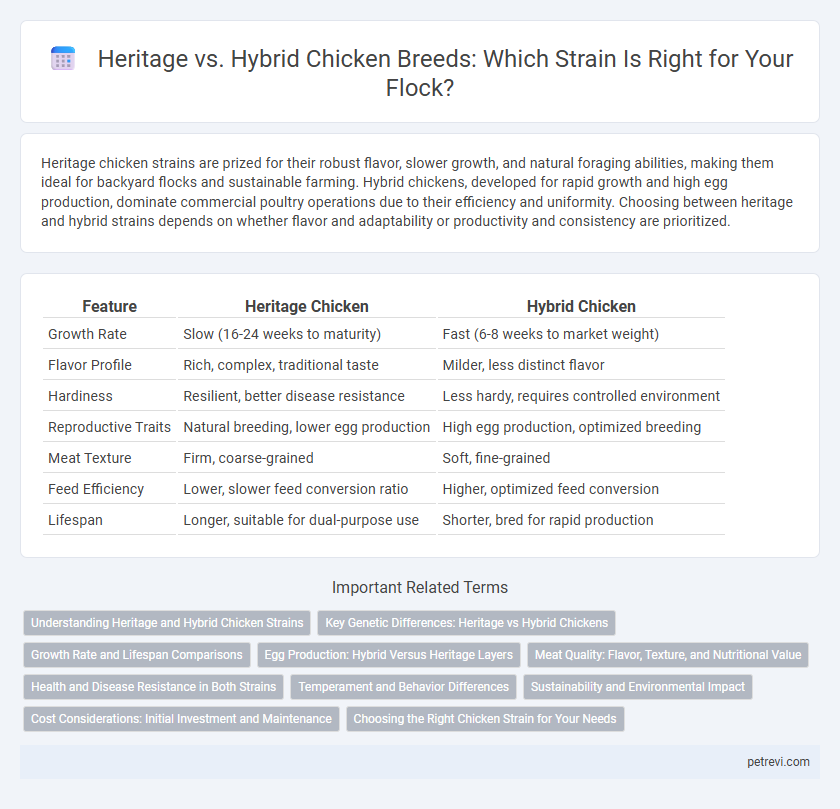Heritage chicken strains are prized for their robust flavor, slower growth, and natural foraging abilities, making them ideal for backyard flocks and sustainable farming. Hybrid chickens, developed for rapid growth and high egg production, dominate commercial poultry operations due to their efficiency and uniformity. Choosing between heritage and hybrid strains depends on whether flavor and adaptability or productivity and consistency are prioritized.
Table of Comparison
| Feature | Heritage Chicken | Hybrid Chicken |
|---|---|---|
| Growth Rate | Slow (16-24 weeks to maturity) | Fast (6-8 weeks to market weight) |
| Flavor Profile | Rich, complex, traditional taste | Milder, less distinct flavor |
| Hardiness | Resilient, better disease resistance | Less hardy, requires controlled environment |
| Reproductive Traits | Natural breeding, lower egg production | High egg production, optimized breeding |
| Meat Texture | Firm, coarse-grained | Soft, fine-grained |
| Feed Efficiency | Lower, slower feed conversion ratio | Higher, optimized feed conversion |
| Lifespan | Longer, suitable for dual-purpose use | Shorter, bred for rapid production |
Understanding Heritage and Hybrid Chicken Strains
Heritage chicken strains are traditional breeds known for their natural growth rates, longevity, and ability to forage, making them ideal for sustainable and backyard farming. Hybrid chicken strains result from crossbreeding selected for rapid growth, high egg production, and uniformity, often used in commercial poultry operations for maximum efficiency. Understanding the differences involves recognizing heritage breeds' genetic diversity and resilience versus hybrids' optimized productivity and specialized traits.
Key Genetic Differences: Heritage vs Hybrid Chickens
Heritage chickens possess diverse, stable genetic traits passed down through traditional breeding, resulting in slower growth rates and enhanced disease resistance. Hybrid chickens are selectively bred for optimized traits such as rapid growth, higher egg production, and uniformity, often sacrificing genetic diversity. These key genetic differences influence longevity, adaptability, and overall performance in poultry farming.
Growth Rate and Lifespan Comparisons
Heritage chicken strains grow slower, typically reaching market weight in 16-24 weeks, but they offer longer lifespans of 5-8 years due to robust genetics and natural resilience. Hybrid strains are engineered for rapid growth, often achieving market weight within 6-8 weeks, however, their lifespan is considerably shorter, usually 1-3 years, as a trade-off for fast meat production. Comparing growth rate and lifespan reveals hybrids prioritize efficiency, while heritage breeds ensure longevity and genetic diversity.
Egg Production: Hybrid Versus Heritage Layers
Hybrid chicken strains outperform heritage breeds in egg production, often laying between 250 to 300 eggs annually, compared to heritage layers which typically produce 150 to 200 eggs per year. While hybrids are genetically selected for maximum yield and consistent egg size, heritage breeds excel in longevity and adaptability to free-range environments. Consumers seeking higher egg output and efficiency typically prefer hybrids, whereas heritage layers appeal to those valuing breed diversity and natural rearing traits.
Meat Quality: Flavor, Texture, and Nutritional Value
Heritage chicken strains, known for slower growth and natural foraging, typically offer superior meat quality with richer flavor, firmer texture, and higher omega-3 fatty acids compared to hybrid strains. Hybrid chickens, bred primarily for rapid growth and feed efficiency, often have milder taste with softer meat and lower nutritional density. Consumers seeking premium culinary experience and nutritional benefits often prefer heritage breeds over hybrids.
Health and Disease Resistance in Both Strains
Heritage chicken strains exhibit stronger natural disease resistance due to their genetic diversity and slower growth rates, promoting robust immune systems. Hybrid chickens are selectively bred for rapid growth and high productivity, but often require more medical intervention to manage health issues and are more vulnerable to common poultry diseases. Choosing heritage strains can reduce reliance on antibiotics and improve flock resilience, while hybrids may benefit from enhanced biosecurity measures to mitigate disease risks.
Temperament and Behavior Differences
Heritage chicken strains often exhibit calmer, more predictable temperaments, making them suitable for backyard flocks and small-scale farming. Hybrid chickens, bred for rapid growth and productivity, may display more aggressive or flighty behavior due to selective breeding pressures. Understanding these temperament differences aids in selecting the ideal strain for specific poultry management goals.
Sustainability and Environmental Impact
Heritage chicken breeds promote sustainability through their natural adaptability and slower growth rates, reducing resource-intensive inputs and environmental degradation. Hybrid strains, while optimized for rapid growth and higher yields, often demand intensive feed, water, and energy consumption, increasing environmental impact. Choosing heritage strains supports biodiversity and long-term ecological balance in poultry farming systems.
Cost Considerations: Initial Investment and Maintenance
Heritage chicken strains typically require a higher initial investment due to slower growth rates and increased feed consumption over time, leading to greater production costs. Hybrid strains offer cost efficiency with rapid growth and improved feed conversion ratios, reducing overall maintenance expenses. Producers must weigh these factors against long-term value and market preferences when selecting between heritage and hybrid chickens.
Choosing the Right Chicken Strain for Your Needs
Heritage chicken strains offer robust genetics with natural disease resistance and excellent foraging abilities, making them ideal for sustainable, small-scale farming and backyard flocks. Hybrid chicken strains are bred for maximum productivity, providing higher egg yield and faster growth rates suited for commercial meat and egg production. Selecting the right chicken strain depends on priorities like flavor, longevity, egg production, and adaptability to your environment.
Heritage vs Hybrid for Chicken Strain Infographic

 petrevi.com
petrevi.com